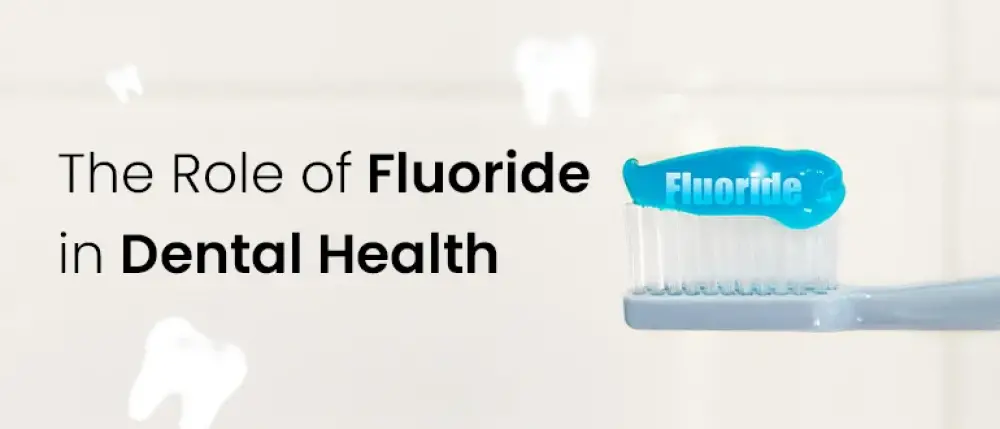Subscribe to get weekly insights
Always stay up to date with our newest articles sent direct to your inbox
Published on 22 Aug, 2024
Updated on 22 Aug, 2024
724 Views
4 min Read

Written by Mudit Handa
favorite0Like
favoriteBe the First to Like
Have you ever wondered how something as simple as the water you drink or the toothpaste you use might contain fluoride, a natural mineral that strengthens your dental health? From protecting the outer layer of your teeth, known as enamel, to fighting cavities, fluoride is the oral health champion. In this article, we delve into the benefits of fluoride and how it supports your oral health.
Fluoride is a naturally occurring mineral found in rocks, soil, and water. It is also found in different types of foods and water and has the known benefits of thickening teeth enamel and maintaining oral health. While an excess of fluoride consumption can trigger oral concerns, an adequate intake can add multiple benefits.
From preventing the growth of bacteria and cavities to reversing early tooth decay, fluoride plays a key role in preventing dental caries and maintaining overall dental health. There are different types of fluorides, and it is important to understand which form is beneficial to your oral health.
Now that you have an idea about fluorides, let’s explore how they can practically help strengthen your teeth by creating a fighting sword against bacteria and the role of fluoride in the treatment of dental caries:
Strengthening enamel is a well-known benefit of fluorides. It works in multiple ways to create a fort around the enamel that stops bacteria from attacking, by:
Acid attacks are possibly the biggest reason for early tooth decay. Including fluorides for oral health helps create resilience against acid attacks.
A weak enamel stems primarily from a lack of calcium and phosphate. Fluoride helps remineralise and redeposit essential minerals in the enamel for healthier growth.
Fluoride is an essential mineral that builds a crystalline structure that is essential for enamel health.
Sensitivity is probably the most common issue faced by people of all ages. The sensation you feel every time you eat your favourite ice cream or grab a cup of iced drink stems from a lack of healthy enamel. Fluoride is known for its desensitising effect by reducing nerve-ending exposure to promote the strengthening of teeth enamel. Additionally, several fluoride toothpaste options are available, along with washes made with fluoride as the base element to treat sensitivity.
Fluoride is a key element used by dentists to build strong tooth enamel and treat tooth decay, cavities, and several other oral diseases. It is found in mouthwashes, treatment gels, toothpaste, and medicines that your dentist might recommend.
Fluoride supports teeth, enamel, and gum health primarily by performing two functions:
Known for reducing early tooth decay, it creates a shield against several common gum diseases.
Healthy gums and teeth are mutually inclusive, with fluorides as a perfect balancing mineral.
Fluorides, as discussed above, are naturally occurring minerals that can easily be found in water and different types of food. But is a natural percentage enough to combat tooth and gum diseases? While your dentist might have an accurate answer, on average, adding fluorides through additional sources makes for a smart old health step. Fluorides are used in dentistry, mainly in the form of:
Despite being a natural mineral, fluoride might be lacking in your everyday diet (or at least not in the form that can support oral health). Hence, you need to explore its sources that can easily be included in your everyday lifestyle. Here’s a list of fluoride-rich sources:
Fluorides play a major part in the world of dental health and oral hygiene. However, you should be mindfulwhen it comes to its usage. Here are some importantfacts about fluorides:
Care Health Insurance offers comprehensive plans that include dental OPD consultations and treatment under optional benefit cover.
Also Read: Inflammatory Bowel Disease: Cause, Symtoms and Treatment
Fluorides have been a part of dental health care for decades, and through these years, medical science has evolved to introduce multiple fluoride treatments for teeth. Dentists use gel, foam, or varnish as a common practice to treat early tooth decay and strengthen enamel. While it is an important element for oral health, fluorides can not be consumed in their raw form or in high percentages as they can have harmful effects. So, if you have been facing any signs of oral concern, visit your dentist for a dental check-up.
Disclaimer: The above information is for reference purposes only. Kindly consult your general physician for verified medical advice. The health insurance benefits are subject to policy terms and conditions. Refer to your policy documents for more information.
favoriteBe the First to Like
Thyroid : मामूली नहीं हैं महिलाओं में थायराइड होना, जानें इसके लक्षण और घरेलू उपचार Vipul Tiwary in Diseases
शुगर कंट्रोल कैसे करे? जानें, डायबिटीज में क्या खाना चाहिए Vipul Tiwary in Health & Wellness
हाई ब्लड प्रेशर को तुरंत कंट्रोल कैसे करें? देखें इसके उपाय Vipul Tiwary in Diseases
पैरों में दर्द किस कमी से होता है? जानें, इसके घरेलू इलाज Vipul Tiwary in Health Insurance Articles
Struggling with Ear Ringing? Explore Hyperacusis Treatment Strategies Nidhi Goyal in Health Insurance Articles
Mohs Surgery for Skin Cancer: Why it Delivers the Best Results? Jagriti Chakraborty in Surgery
Beyond the Kissing Disease: A Quick Guide to the Epstein-Barr Virus (EBV) Mudit Handa in Diseases
Triphala, From Tradition to Trial: How Modern Science backs its Gut Benefits Mudit Handa in Diet & Nutrition
Always stay up to date with our newest articles sent direct to your inbox
Loading...